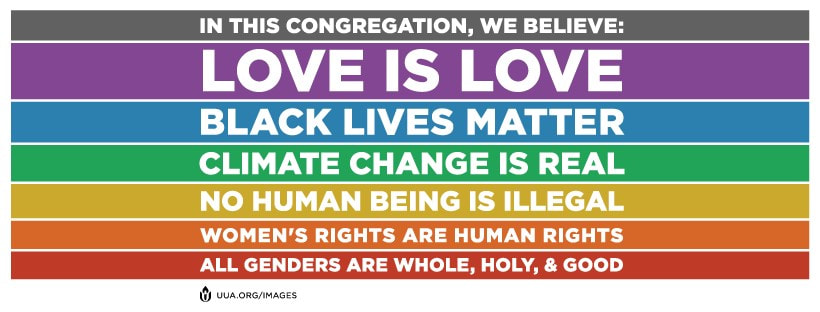|
Erika Sanders, Beloved Community Staff Team
As Unitarian Universalists, while we value freedom of individual belief, we covenant with one another to place justice at the center of our faith. That means grounding our justice work in theological, spiritual reflection. Engagement of Unity Church with the wider community happens, in large part, thanks to the work of nine dedicated Community Outreach Ministry Teams. In 2021, ministry teams began a structured process of renewal (see the April commUNITY newsletter) that includes a new model of grounding justice work in spiritual reflection. The two teams I spoke with that engaged with that model, the Double Helix Model of Faith Formation and Antiracist Multicultural Work, provided invaluable feedback, had good conversations, but experienced varying levels of success. With new opportunities to work with the Double Helix coming up this fall, more doors to greater understanding and depth will open for everyone in the congregation. Nicole Lynskey of the Act for the Earth Team spoke with me about the benefits of working with the Double Helix. Erika: How did you experience the renewal process? Nicole: Although the Act for the Earth Team is decentralized with four different subteams, we made time in other meetings where most of us were together, such as team happy hours and a four-hour retreat in January, where about 25 team members were present. We found this curriculum to lead us to deep and meaningful conversation. Erika: Did you find that the renewal process changed your understanding of spirituality and faith formation in connection to the work your team does? Nicole: Talking about spirituality in relation to our work is embedded in the Act for the Earth Team. For many of us, working in nature is spiritual, and that shows in the way we meet and our relationships with each other. We sometimes sing as part of meetings, and our spirituality/justice subgroup is about to introduce rituals for our meetings. And talking about climate change can be so depressing that you need to have a spiritual grounding; otherwise, you just want to give up. We know there’s a spiritual component to being persistent, especially in a context where all forces seem aligned against our success. Erika: When you worked with the Double Helix Model, how did that feel? Did it shape how you see your work as a team, and the relationship between your faith formation and antiracism? Nicole: Since many on the Act for the Earth Team have taken the IDI, and are in accountability groups following our IDI experience, the Double Helix Model didn’t feel hard; it felt like another piece of the work that helps us stay focused. For some members of the team, perhaps there was a question: “why are we doing this now, when other things feel more urgent?” Other team members felt that the need to explore the connection between faith and antiracist multicultural work was more obvious. In the end, though, I think we all found it worthwhile. We’ve also partnered with organizations such as Honor the Earth, which is led by Indigenous people. We’ve tried to follow that leadership in respectful and authentic ways, and to immerse ourselves in organizing processes that may be unfamiliar to those of us embedded in predominantly white culture. That work will be a continuous process, and the Double Helix Model will influence that. Note that the Double Helix Model is not available just to teams, but to all of us engaged in justice and community work. Rev. KP Hong, who developed the model with Laura Park, acknowledged the challenge of antiracist multicultural faith formation work. He weighed in on some essential questions for teams and for all of us doing social justice work:
This is a complex, demanding, and long-haul process, which seems to be a hallmark of Unitarian Universalism. But as UUA President Susan Frederick-Gray reminded us, “We are resilient. We have everything we need. We are enough. Love will continue to guide us.”* Contact Drew Danielson to find out more about the IDI and to sign up to take it: [email protected]. *“From the UUA President: Listening to the Call of Love” by Susan Frederick-Gray. UUA, January 14, 2021.
0 Comments
|
Topics
All
Beloved Community ResourcesUnity Justice Database
Team Dynamics House of Intersectionality Anti-Racism Resources in the Unity Libraries Collection Creative Writers of Color in Unity Libraries The History of Race Relations and Unity Church, 1850-2005 Archives
July 2024
Beloved Community Staff TeamThe Beloved Community Staff Team (BCST) strengthens and coordinates Unity’s antiracism and multicultural work, and provides opportunities for congregants and the church to grow into greater intercultural competency. We help the congregation ground itself in the understanding of antiracism and multiculturalism as a core part of faith formation. We support Unity’s efforts to expand our collective capacity to imagine and build the Beloved Community. Here, we share the stories of this journey — the struggles, the questions, and the collaborations — both at Unity and in the wider world.
The current members of the Beloved Community Staff Team include Rev. Kathleen Rolenz, Rev. KP Hong, Rev. Lara Cowtan, Drew Danielson, Laura Park, Lia Rivamonte and Angela Wilcox. |
